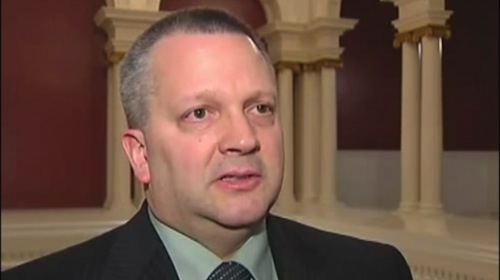Last week, during the end of Pennsylvania’s legislative session, Rep. Brian Sims (D–Philadelphia) took the floor to speak about the Supreme Court’s DOMA ruling. Under PA house rules, legislators can speak about uncontroversial issues at the end of the session by unanimous consent. Sims, who is gay, had his mic cut a few seconds into his remarks, owing to the objections of Rep. Daryl Metcalfe. Indignant Democrats subsequently took the floor to speak about DOMA themselves, only to have their mics cut, too. It was a mess. In defending his maneuver, Metcalfe told Pittsburgh’s KDPA:
His talking about that on the House floor would have been an open rebellion against Almighty God and God’s word, against God’s law. And as a Christian, if I would have sat there and been silent, it would have violated my conscience because of my beliefs as a Christian.
Exegesis after the jump.
First of all, it appears that what Metcalfe did to Sims is acceptable under Pennsylvania House rules. The floor is opened at the end of the session under unanimous consent of those present, meaning that any member can object to another member’s remarks. Those remarks are generally uncontroversial—wishing other members a happy birthday, praising the third season of Seinfeld for its dramatically improved lighting, whatever. Sims might have expected that praise of the Supreme Court’s decision might be deemed controversial, and he was warned as much by the House Speaker.
That said, Metcalfe did not know the content of Sims’s remarks. According to reports, he objected about four words in. It is entirely possible that Sims might have spoken about his personal satisfaction with the court’s decision, as he subsequently said he intended to. It is also questionable whether praise for the United States Supreme Court could be controversial on the floor of a state legislature. In practice, Supreme Court decisions are controversial all the time, but in theory at least, a lawmaker should be free to speak favorably of the highest court in the land.
But Metcalfe is a Christian. When you eliminate the tautologies, his defense of his objection boils down to “I am a Christian.” The claim that allowing Sims to speak would have violated his conscience because of his beliefs collapses to “I am a Christian.” His assessment that allowing another legislator to speak on the floor would violate “God’s law,” by comparison, collapses to “I am the Pope.”
The proper interpretation of God’s law is a sticky question, as demonstrated by this helpful screencap. Fortunately for all of us, though, American political discourse does not follow scripture. Unfortunately, it does follow the general dictate that religious beliefs be accorded respect and even deference in most situations.
In this way, religious conviction has become a protected class of belief. Had Metcalfe proclaimed himself a Strangelovian Scientist who opposed homosexuality because it fostered negative health outcomes by wasting precious bodily fluids, we would demand proof. We would at least demand more rigorous logic than “as a Strangelovian Scientist, if I would have sat there and been silent, it would have violated my conscience because of my beliefs as a Strangelovian Scientist.” But by appealing to his own professed Christianity, Metcalfe places his opposition to homosexuals beyond the boundaries of debate.
I mean “opposition to homosexuals” and not “opposition to homosexuality.” Sims is Pennsylvania’s first and only openly gay legislator, and Metcalfe cut him off before he knew the content of Sims’s speech. For this reason, Sims is an interesting test case in how different claims are treated in American political discourse.
Whereas Metcalfe can justify his opposition to mere discussion of DOMA on the House floor by situating it within a larger religious system of belief, Sims cannot similarly justify his support for gay marriage. “I think gay people should have the right to marry” is a secular belief, and it therefore must be accompanied by explanations and even evidence. Unlike a claim of religious belief, Sims’s position is treated as an argument rather than a premise.
That this position is an extension (presumably) of his sexual orientation—something at least as foundational to Sims’s personality as Metcalfe’s Christianity—carries less weight than a claim of religious belief. Sims must appeal to constitutional rights, compassion for social minorities, the rules of the PA House or some other accepted value. Metcalfe, by comparison, need only insist that he is a Christian. We don’t even ask him to justify how Christianity dictates that he silence his political opponents, or why he is an accepted arbiter of God’s law. The appeal to religious belief is justification in itself.
I submit that Metcalfe’s beliefs are stupid. It is a mistake for us to place his and similar claims of belief outside the purview of debate simply because they have been branded as Christianity. This is a nation that rejects an establishment of religion. That doesn’t mean we establish all of them as beyond reproach.





Exegesis H. Christ. Well done.
Karl Miller will win the “Best Comment” award today, I think.
Superfluous background: Cranberry (where Daryl Metcalfe calls home) lies at the unholy nexus of the uber-conservative suburbs of Pittsburgh (the 1% who think capital gains should be tax free) and the evangelical country (where people vote their shirts off their backs because they’re afraid of two men kissing). The byproducts/elected officials of these overlapping segments are really a joy.